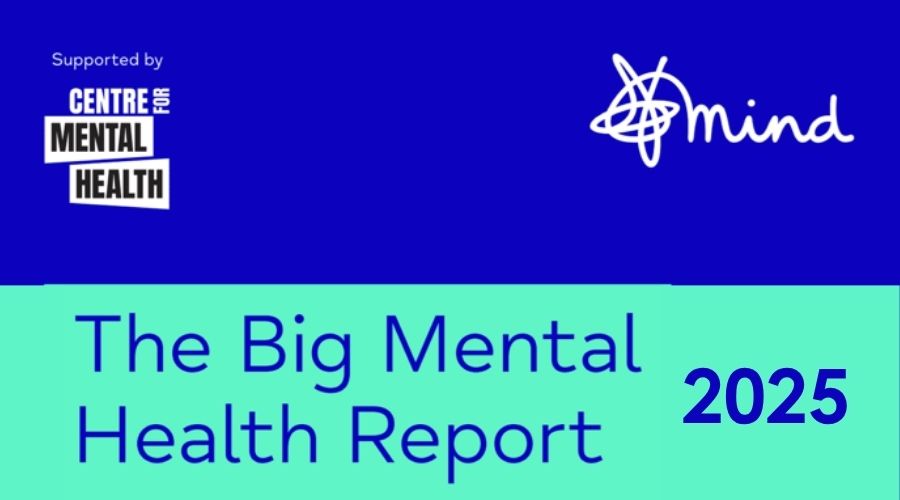
Mind have released their 2025 ‘Big Mental Health Report’ – so what’s changed?
So let’s compare data from the Big Mental Health Report 2024, as this is the second year that MIND UK have shared their annual look at mental health in England and Wales. The Big Mental Health Report 2025 reveals a deeply worrying picture for mental health in the UK, highlighting not just persistent challenges but a significant reversal in public understanding and a deterioration in the experience of accessing support.
The findings from the 2025 report contrast sharply with the optimism of previous years, including the context outlined in features like the 2024 report summary (see: Mental Health Report 2024). Where progress was once assumed, the new data indicates a nationwide regression on several critical fronts.
Summary of Key Changes: A Crisis of Stigma and Access
The primary shifts noted in the 2025 report fall into three critical areas:
1. A Steep Regression in Public Attitudes and Stigma
The most concerning change is the broad decline in public mental health knowledge and acceptance across England and Wales. Comparing 2024 data to previous years shows a significant regression, in some cases falling below 2009 baseline levels:
- Knowledge is Slipping: The Mental Health Knowledge (MAKS) Score fell by 3.5% from 2023 to 2024, now registering below 2009 baseline levels for the first time.
- Community Acceptance Has Dropped: Agreement that residents have “nothing to fear” from people accessing mental health services in their neighbourhood significantly decreased from 70.8% in 2023 to 62.8% in 2024.
- Stigma is Rising: Agreement that people with schizophrenia are a danger to others rose significantly from 26.7% to 31.9%.
- Belief in Recovery Has Faltered: The proportion agreeing that people with severe mental health problems can fully recover dropped from 59.1% to 53.1%.
2. Deterioration in Experiences of Accessing Support
Comparing the 2025 Big Mental Health Survey (BMHS) findings with the 2019 BMHS highlights substantial barriers in accessing healthcare, likely exacerbated by the pressures of the pandemic and cost-of-living crisis:
- Reduced Access and Ease: The percentage of respondents accessing GP support fell from 71% to 66%. Furthermore, the perception of finding access “very/somewhat easy” dropped from 57% to 52%.
- Increased Unmet Needs and Unfair Treatment: The proportion of people reporting their GP support did not meet their needs increased by 6 percentage points (from 27% to 33%). Worryingly, reports of unfair treatment rose significantly, from 26% to 34% in GP settings, and more than doubled in the voluntary sector, rising from 9% to 19%.
- Holistic Care Gap: An increasing proportion of people wanted to discuss their physical and mental health together but did not do so, rising from 26% to 31%.
3. Increased Prevalence and Systemic Underfunding
The broader mental health context is also worsening:
- Suicide Rates: The 2025 report cites an estimated 7,055 deaths by suicide registered in England and Wales in 2023, a significant increase from the 6,069 figure cited in the 2024 report, noting this is the highest level since 1999.
- Loneliness: ONS data cited in the 2025 report indicates that 24% of adults feel lonely “often, always or some of the time,” pointing to a pervasive issue in the social fabric.
- Mental Health Funding is Falling: The report highlights that the share of NHS funding in England allocated to mental health services is projected to fall from 8.78% in 2024–25 to 8.71% in 2025–26.
What are implications of these findings for education?
The findings of the Big Mental Health Report 2025 indicate that UK schools will face significant, compounding pressures over the next year:
1. Increased Strain on Internal Pastoral and Counselling Services
Given the documented decreased ease of access to GP services and the rising levels of unmet need (33%), young people will inevitably rely more heavily on school-based support.
- Action: Schools must anticipate a surge in demand for internal counselling and pastoral care teams. Resources should be allocated to increase staff capacity in these areas, perhaps through enhanced training for teaching and non-teaching staff (e.g., Mental Health First Aid) to handle the initial triage of students’ needs.
2. The Mental Health Stigma Barrier Rises
The nationwide regression in public knowledge and acceptance means that anti-stigma work within schools will become significantly more challenging. Students and staff may be less willing to engage honestly, and the community context outside the school gate is less supportive.
- Action: Schools need to intensify anti-stigma education through the curriculum (e.g., PSHE and RSE) and whole-school campaigns. Furthermore, it is critical to address potentially stigmatising attitudes among staff via mandatory professional development, particularly concerning severe mental illness, which saw the sharpest rise in negative perceptions.
3. Focus on Preventative and Systemic Wellbeing
With loneliness soaring (24% affected) and the cost-of-living crisis continuing to impact wellbeing, schools cannot rely solely on clinical intervention.
- Action: Priorities for the next 12 months should centre on proactive, preventative measures. This includes investing in peer support programmes, strengthening the provision of social-emotional learning, and ensuring robust systems are in place to support students affected by economic hardship, as this context is a key driver of mental distress.
4. Navigating the Deteriorating External Pathway
The increase in reported unfair treatment and unmet needs in both NHS and voluntary sector pathways means that when schools do refer a young person out for support, the outcome is less predictable and potentially less satisfactory.
Action: School mental health leads must establish stronger, more formalised links with local Child and Adolescent Mental Health Services (CAMHS) and local voluntary sector partners. This partnership should aim to streamline referral processes, manage expectations with families and students, and advocate strongly on behalf of children and young people for access to services that are projected to be increasingly underfunded.
Get advice and training for your whole school mental health and wellbeing strategy with AMHIE

AMHIE’s DfE-aligned training equips your whole-school team to achieve mental health excellence and secure outstanding inspection outcomes. The clear ROI lies in transforming your core school culture and practices from reactive support to proactive prevention. This strategic shift allows your staff to confidently move away from traditional sanctions and toward implementing alternative, positive behaviour management strategies, creating a supportive learning environment. This is your evidence-based pathway to compliance and long-term well-being success. Join over 1,500 trained leaders who trust AMHIE.
Ready to embed a positive whole-school approach? Explore the full AMHIE training offer and secure your team’s place today: Visit the AMHIE Training Page
